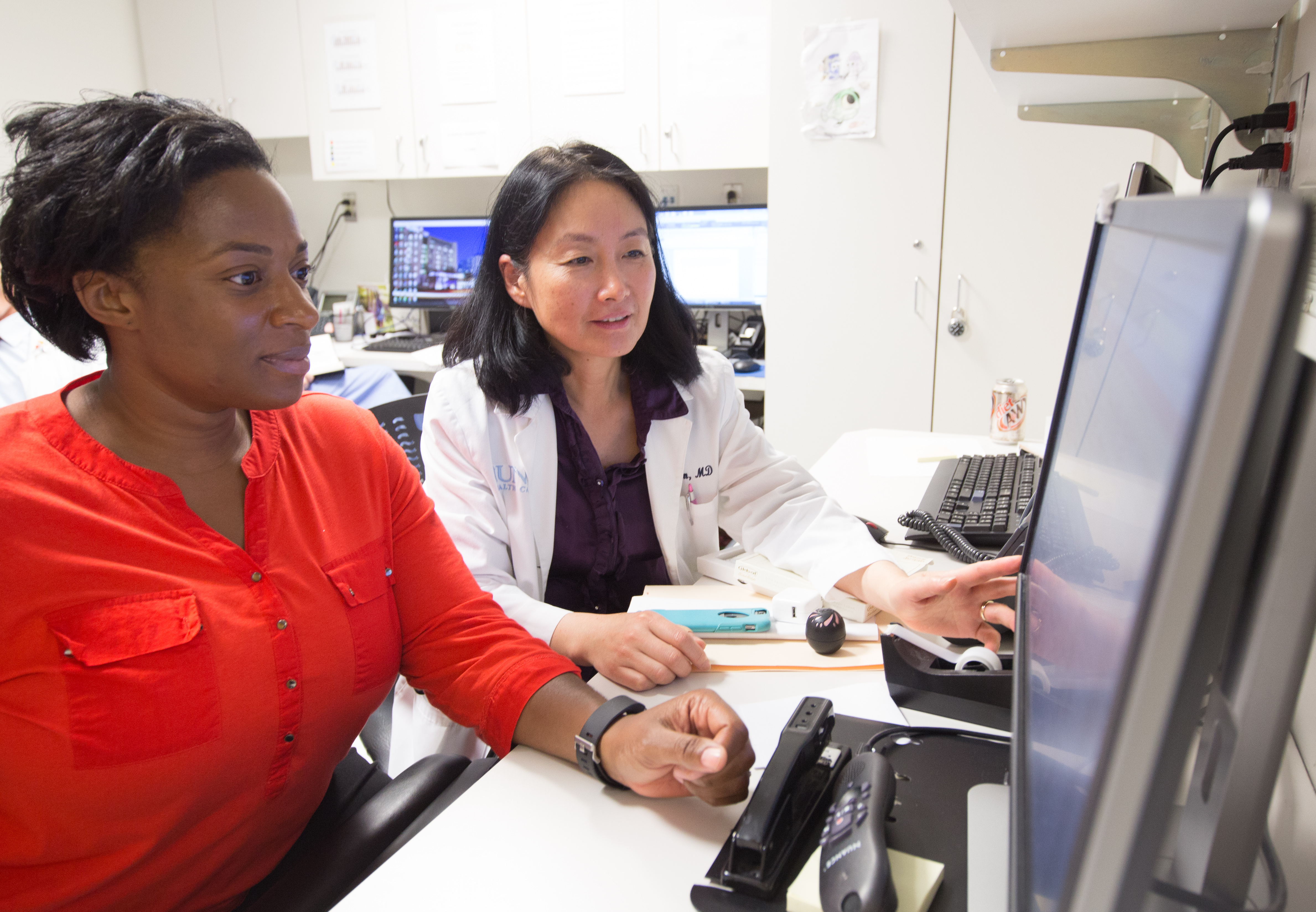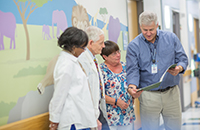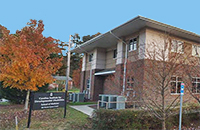Program Description
 The UNC Child Neurology Residency Program is an ACGME-accredited program (PGY1-PGY5) that accepts two categorical residents per year. After residents complete two years of training in pediatrics, their third year is spent predominantly in adult neurology training, where they participate in the evaluation and management of patients with a variety of neurological diseases. The following two years are dedicated to child neurology, with twelve months of clinical child neurology training at the NC Children’s Hospital, a tertiary care center, where emergency medicine, inpatient services, and outpatient clinics are located.
The UNC Child Neurology Residency Program is an ACGME-accredited program (PGY1-PGY5) that accepts two categorical residents per year. After residents complete two years of training in pediatrics, their third year is spent predominantly in adult neurology training, where they participate in the evaluation and management of patients with a variety of neurological diseases. The following two years are dedicated to child neurology, with twelve months of clinical child neurology training at the NC Children’s Hospital, a tertiary care center, where emergency medicine, inpatient services, and outpatient clinics are located.
Also during the last two years, twelve months of elective rotations are offered in a wide range of research and clinical settings, from subspecialty clinics, to inpatient services, research and practice improvement focus rotations. Some examples of elective rotations include: epilepsy, sleep medicine, the Carolina Institute of Developmental Disabilities (CIDD), offering opportunities such as the LEND program, pediatric psychiatry, pediatric neurosurgery, neuro-critical care, neuromuscular-neurophysiology, pediatric physical medicine and rehabilitation, the palliative care team, and many more. We work with each resident to tailor a training plan that best fits their individual interests and career goals. All adult and pediatric inpatient rotations and child neurology clinics are located at UNC Hospitals main campus, and adult neurology specialty clinics are at the Neurology outpatient clinic.
Recruitment
We are offering two categorical five-year positions (PGY1-PGY5).
Applications are submitted through the National Residency Matching Program (NRMP) using the Electronic Residency Application Service (ERAS) system. Applicants need only apply to the UNC Child Neurology residency via ERAS – a separate application to UNC Pediatrics is not necessary.
The American Board of Pediatrics requires the following schedule for the Pediatric portion of training:
- 5 units Inpatient Pediatrics
- 2 units NICU
- 2 units PICU
- 3 units Emergency Medicine/Acute Illness (at least 2 months in ED)
- 2 units Ambulatory Experience to include Community Pediatrics and Child Advocacy
- 4 units Subspecialty (at least 3 units of core subspecialties)
- 1 unit Adolescent Medicine
- 1 unit Developmental-Behavioral Pediatrics
- 1 unit Normal Newborn Experience
- QI Project
More information about the first two years of the residency program is available on the UNC Department of Pediatrics website.
Adult Neurology
Inpatient – 6 months, divided between neurology ward and consult service
Outpatient – 3 months, some examples – neuro-muscular disorders, neuro-immunology, movement disorders, sleep clinic
Elective – 3 months, some examples – neuroradiology, neuropathology, neurophysiology, epilepsy
Majority of Adult Neurology rotations are completed in PGY3
Child Neurology
Inpatient – 8 months
Outpatient – 4 months
Majority of Child Neurology rotations are completed in PGY4, and some in PGY5
Electives, Child Neurology
Total of 12 months. Required rotations: child psychiatry, neurosurgery, research. Other electives for example – genetics, palliative care, neurodevelopmental disabilities clinic, pediatric EEG and epilepsy monitoring unit
Majority of Child Neurology elective rotations are completed in PGY5, and some in PGY4
Facilities
UNC Child Neurology residents primarily train at the UNC Hospitals Medical Center in Chapel Hill and at the Children’s Specialty Services Clinic in Raleigh.
Residents train in diverse inpatient settings such as the inpatient ward services, the neurology consultation service, and the epilepsy monitoring unit. The neurology inpatient consultation service provides neurology consultations for all UNC Hospitals and UNC Emergency Room.
 North Carolina Children’s Hospital
North Carolina Children’s Hospital
The North Carolina Children’s Hospital opened as a separate, state-of-the-art structure in 2002. Each year, more than 70,000 children from all 100 North Carolina counties come to UNC for over 200,000 visits for diagnosis and treatment. The Children’s Hospital serves as the primary teaching facility for our residents. It adjoins the Memorial, Women’s, Neurosciences and Cancer Hospitals which make up the UNC Hospitals campus. Read more…
 Cone Health
Cone Health
Moses Cone Health System is a not-for-profit, community-based, system of five hospitals located in Greensboro, NC. Residents rotate at the flagship hospital, Moses H. Cone Memorial Hospital in the 18-bed pediatric inpatient unit and also in the newly opened Cone Health Center for Children. Our residents have had the pleasure of rotating at Cone for nearly 30 years.
 WakeMed
WakeMed
For over 40 years, our residents have enjoyed working at WakeMed. Located in Raleigh, WakeMed is a 760-bed private, not-for-profit health care system. A new Children’s Hospital with 25 inpatient rooms and 12 observation rooms opened in 2010; there are over 143,000 admissions a year. In addition to providing care to the children of Wake County, WakeMed serves as a referral hospital servicing many of the surrounding counties.
 UNC Children’s Hospital, Chapel Hill NC
UNC Children’s Hospital, Chapel Hill NC
The UNC Children’s Hospital is our primary training site. See a full description above under “Pediatric Rotations.”
 UNC Child Neurology Clinic
UNC Child Neurology Clinic
UNC Children’s Hospital, Chapel Hill, NC
The Children’s Specialty Outpatient Clinic is located on the ground floor of the NC Children’s Hospital. Twenty pediatric subspecialty services provide tertiary care to an average of 180 patients each day. The clinic features 40 exam rooms and a large, child-friendly waiting room that is frequently visited by volunteer services personnel bringing fun activities and therapy dogs.
Child Neurology providers see an average of 24 patients each day, utilizing 5-8 exam rooms. The division has a workroom in the Specialty Clinic with eight workstations and an EPIC communication board that posts each provider’s schedule and patient arrival times.
 CIDD Clinic Carrboro, NC
CIDD Clinic Carrboro, NCLocated three miles from the Children’s Hospital
 UNC Neurology Clinic Chapel Hill, NC
UNC Neurology Clinic Chapel Hill, NC- Advanced core facilities are located within the Neuroscience Center and throughout the UNC campus.
- An NIH-funded Clinical Research Center is available for faculty and resident clinical studies.
- Advanced 3T-fMRI, 7T-fMRI and PET imaging facilities are also available.
- The UNC School of Public Heath, one of the major public health schools in the United States, provides outstanding collaborative possibilities for residents interested in disease prevention and health care policy.
- The UNC School of Medicine also maintains a highly successful program in mentorship and assistance for senior residents and junior faculty applying for NIH Career Development Awards and other mentored funding.
- The relatively high number of elective months in the UNC Child Neurology residency program, along with a highly supportive and interactive research environment, provides a very high success rate for residents pursuing fellowship and other post-residency academic paths.
